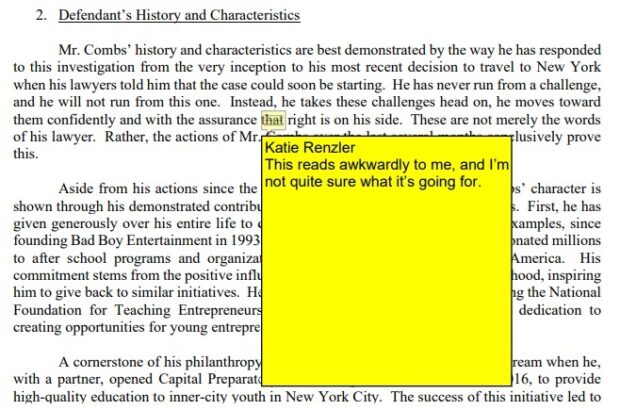As
many
attorneys
intrinsically
understand,
there
is
an
unwritten
dress
code
that
most
lawyers
adhere
to
when
they
appear
in
court.
Although
I
am
unclear
about
the
dress
code
for
women,
most
lawyers
would
agree
that
men
should
wear
suits,
ties,
and
dress
shoes
when
they
appear
in
court.
Although
American
lawyers
do
not
wear
wigs
or
other
similar
accoutrements
of
the
legal
profession
to
court,
dressing
more
formally
to
court
makes
it
easier
for
court
staff
to
identify
lawyers
and
allows
attorneys
to
convey
their
respect
for
the
judicial
process.
Since
the
return
to
in-person
appearances
after
the
COVID-19
pandemic,
it
seems
like
an
increasing
number
of
lawyers
appear
in
court
in
apparel
that
does
not
abide
by
this
understood
dress
code.
Over
the
past
several
years,
I
have
seen
many
men
appear
in
court
in
suits
without
ties.
While
ties
can
sometimes
be
annoying,
putting
one
on
is
relatively
easy,
so
I
am
not
sure
why
so
many
attorneys
forgo
wearing
ties
to
court.
One
of
the
things
that
typically
distinguishes
business
formal
and
business
casual
attire
is
a
tie,
so
it
seems
like
it
would
be
a
no-brainer
that
male
attorneys
would
wear
a
tie
to
court.
Sure,
there
have
been
occasions
when
I
appeared
in
court
without
wearing
a
tie
or
even
without
wearing
a
suit
jacket.
If
I
was
just
dropping
off
papers
to
a
clerk’s
office
or
a
papers
submissions
part,
it
is
possible
that
I
would
not
wear
a
tie.
Sometimes,
you
might
get
treated
better
if
you
do
not
look
too
much
like
an
attorney.
However,
one
time
when
I
appeared
in
court
in
less
formal
attire,
I
had
to
see
a
judge
to
get
a
stipulation
“so
ordered”
that
I
thought
I
would
just
be
submitting,
so
lawyers
should
be
wary
since
they
may
end
up
seeing
a
judge
after
all
in
more
casual
attire.
Nevertheless,
if
male
lawyers
know
that
they
will
appear
in
front
of
judges,
it
usually
makes
sense
to
put
on
a
tie
since
this
signifies
the
solemnity
of
the
occasion.
Recently,
I
have
also
seen
lawyers
wear
sneakers
to
court
instead
of
dress
shoes.
Usually,
these
sneakers
look
professional
—
black,
brown,
or
some
other
muted
color.
However,
it
is
clear
that
the
footwear
worn
by
these
lawyers
are
not
the
typical
dress
shoes
that
usually
accompany
suits.
I
completely
understand
why
lawyers
would
want
to
wear
sneakers
instead
of
shoes.
Sometimes,
lawyers
need
to
walk
long
distances
to
travel
to
court
with
public
transportation,
and
it
is
more
comfortable
for
such
lawyers
to
wear
sneakers
in
such
instances
rather
than
shoes.
Other
times,
lawyers
have
a
medical
reason,
and
I
once
wore
sneakers
to
court
after
I
injured
my
foot.
However,
it
is
usually
easy
and
affordable
to
pick
up
a
decent
pair
of
dress
shoes,
so
sneakers
might
be
inappropriate
in
most
circumstances.
From
my
experience,
the
type
of
case
and
the
type
of
court
have
a
huge
impact
on
the
clothes
worn
by
a
lawyer
to
court.
I
have
appeared
in
a
number
of
compliance
parts
recently
in
which
dozens,
if
not
hundreds,
of
lawyers
discuss
discovery
disputes
in
front
of
court
staff,
and
lawyers
dress
down
likely
due
to
the
low
likelihood
of
speaking
to
a
judge.
I
have
also
appeared
in
landlord-tenant
courts
frequently
in
the
past
year
or
two,
and
it
seems
that
lawyers
in
such
cases
also
dress
down
on
occasion.
However,
I
have
never
seen
a
lawyer
dress
down
at
appearances
in
any
of
the
federal
cases
I
work
on,
likely
because
federal
courthouses
are
often
much
nicer
than
state
courthouses,
and
the
seriousness
of
the
cases
has
an
impact
on
the
apparel
decisions
of
attorneys.
I
am
not
judging
people
who
might
not
be
able
to
adhere
to
informal
dress
codes
due
to
economic
limitations
or
mistakes,
and
of
course,
people
can
adhere
to
any
dress
code
that
comports
with
their
gender
identity.
It
just
seems
to
me
that
many
lawyers
have
loosened
up
their
dress
code
when
they
appear
in
court
now
that
the
COVID-19
pandemic
has
passed,
and
I’d
love
to
hear
from
readers
of
this
column
who
witnessed
lawyers
dressing
down
in
court.
Ultimately,
if
there
are
no
issues
preventing
a
lawyer
from
dressing
formally
to
court,
this
is
usually
the
best
approach,
since
this
helps
court
staff
identify
lawyers,
and
dressing
formally
shows
the
respect
and
solemnity
attorneys
have
for
the
judicial
process.
 Jordan
Jordan
Rothman
is
a
partner
of
The
Rothman
Law
Firm,
a
full-service
New
York
and
New
Jersey
law
firm.
He
is
also
the
founder
of
Student
Debt
Diaries,
a
website
discussing
how
he
paid
off
his
student
loans.
You
can
reach
Jordan
through
email
at
[email protected].





 Chris
Chris
 Kathryn
Kathryn








